Jail Protesters Against 'Esfahan House' Executions Return
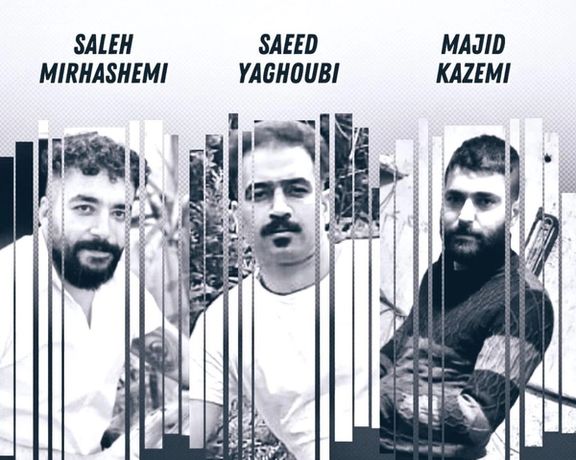
Protestors in cars have gathered outside the jail in Esfahan (Isfahan) in an attempt to stop the execution of three political prisoners.

Protestors in cars have gathered outside the jail in Esfahan (Isfahan) in an attempt to stop the execution of three political prisoners.
The demonstrators drove to the prison in central Iran to protest Wednesday night. Majid Kazemi, Saleh Mirhashemi, and Saeed Yaqoubi are being held in Esfahan, awaiting the death sentence handed down in a trial condemned as a travesty of justice by human rights campaigners.
They were convicted over the death of two IRGC’s Basij militia members and a police officer in protests of November last year, in what Persian media have dubbed the ‘Isfahan House’ case.
Security forces’ gunfire was heard around the jail during the protest.
The three political prisoners wrote from jail on Wednesday urging the people to stop their execution.
Describing themselves as "children of Iran" in the letter, the three prisoners said: "Hello. We ask our dear fellow citizens not to let them kill us. We need your help. We need your support."
On Sunday night, demonstrators had gathered outside the prison hoping to stop the feared hangings.
Opposition activists say the death penalty is being used against the Isfahan House three as an intimidation tactic to stop further protests.
Campaigners say the prisoners were tortured into confessions, and there is no reliable evidence against them.
Iranian expatriate communities plan demonstrations against the executions in cities worldwide on Saturday, May 20.
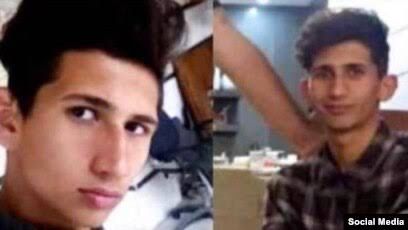
An Iranian detained protester has died days after being freed – the latest death in suspicious circumstances of released activists.
Amir Hossein Tarval Iman was pardoned and released last week after eight months detention but suffered a fatal heart attack a few days later.
His lawyer Maryam Kian Ersi confirmed the death in a tweet on Wednesday.
The "Committee to Follow Up on the Status of Detainees" had announced in a report that Tarval was arrested on October 24, when regime agents raided his home in Aliabad district of Tehran. The report added that he was interrogated and tortured during the detention.
He was tried on a charge of "Moharebeh" or war against God on December 20, facing a possible death penalty.
The committee said Tarval was temporarily released from the notorious Evin prison on bail but died "suspiciously" only ten days later on May 16.
Since protests began last year, regime agents have arrested nearly 20,000 Iranians. Many have been released but a number have died apparently with no certain reason.
19-year-old Yalda Aghafazli died last month after being released from prison without any medical preconditions. Hospital tests indicated a significant amount of narcotics in her blood system.
In November, Arshia Emamgholizadeh, 16, was arrested in East Azarbaijan province for throwing the turban of a cleric. He was kept in prison for ten days and released on bail. He committed suicide two days later. He had told his friends that prison authorities gave them some pills to swallow every night, as well as torturing them.
Some doctors believe that whatever drug was given to some prisoners addicted them to a degree that after being released they experienced severe depression.

Iranian activist and former political prisoner Shima Babaei has been given the 2023 Geneva Summit's International Women's Rights Award.
This is the third time the award has been given to an Iranian woman, after activists Masih Alinejad and Shaparak Shajarizadeh in previous years.
Presenting the 2023 award, Mayor of Frankfurt, Narges Eskandari said: "It is an honor for me to present this award to Shima Babaei, our Iranian daughter."
Then architecture student Shima became synonymous with the “Girls of Revolution Street” demonstrations held across Iran in 2017.
The women's rights activist openly defied the law requiring women to wear headscarves and stood up for political prisoners. The Iranian police repeatedly summoned, arrested, and jailed Shima.
In late 2018, Shima and her husband, fellow activist Dariush Zand, fled Iran after being charged with "assembling and colluding against national security," "propaganda against the state," and "publishing falsehoods on social media" and facing six years of imminent imprisonment.
Currently residing in Belgium, Shima continues her fight against gender discrimination.
She is now fighting for the release of her father, human rights activist Ebrahim Babaei, whose fate and whereabouts have been unknown since he was forcibly taken into custody by the Iranian authorities in December 2021.
The Geneva Summit for Human Rights and Democracy is sponsored by a coalition of 20 non-governmental organizations. Each year, on the eve of the United Nations Human Rights Council's main annual session, activists from around the world meet to raise international awareness of human rights issues.
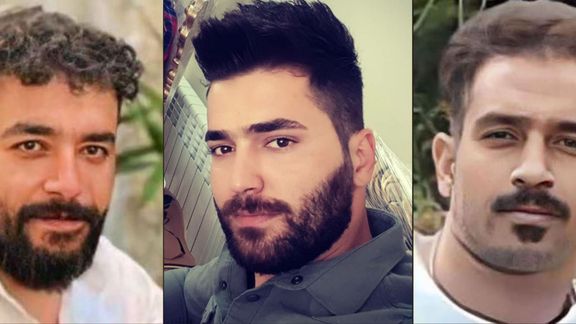
Three political prisoners on death row in Iran have written from jail urging the people to stop their execution.
Saeed Yaqoubi, Saleh Mirhashmi and Majid Kazemi, were convicted over the death of two IRGC’s Basij militia members and a police officer in protests of November last year, in what Persian media have dubbed the ‘Esfahan (Esfahan) House’ case.
Describing themselves as "children of Iran" in the letter, the three prisoners said: "Hello. We ask our dear fellow citizens not to let them kill us. We need your help. We need your support."
Amir Kazemi, Majid's cousin, verified the authenticity of the hand-written letter in an interview with Prague-based Farsi language Radiofarda.
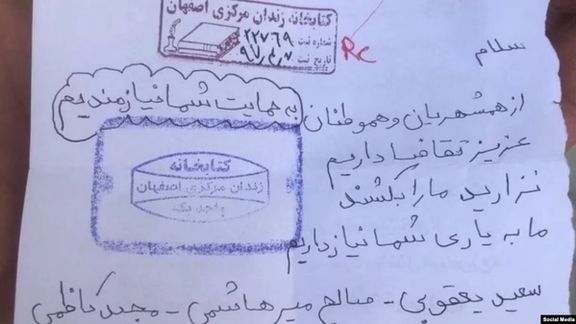
After authorities released videos of three protesters confessing to the killing of three security officers their families expressed concern about their imminent execution.
On Sunday night and again on Wednesday night, people gathered outside Esfahan (Isfahan) Central Prison hoping to stop the feared hangings.
Videos posted by activists show dozens chanting slogans in front of the prison, while gunfire was also heard as thick smoke caused by teargas enveloped the area.
Opposition activists say the death penalty is being used against the Isfahan House three as an intimidation tactic to stop further protests.
Campaigners say the prisoners were tortured into confessions, and there is no reliable evidence against them.
Earlier in the day, Diana Eltahawy, Amnesty International’s Deputy Director for the Middle East and North Africa, called on the international community to take bold action to prevent the execution of the three protesters who were tortured into confessing.
“The shocking manner in which the trial and sentencing of these protesters was fast-tracked through Iran’s judicial system amid the use of torture-tainted ‘confessions’, serious procedural flaws and a lack of evidence is another example of the Iranian authorities’ brazen disregard for the rights to life and fair trial,” she said.
Majid Kazemi said in an audio recording from prison that he was forced to make false self-incriminating statements after interrogators beat him, gave him electric shocks, subjected him to mock executions, and threatened to rape him, execute his brothers and harass his parents.
Iranian expatriate communities plan demonstrations against the executions in cities worldwide on Saturday, May 20.
In a separate development, Iran International has learned that hearings were held for seven people detained during the ‘Women, Life, Liberty’ protests at the Revolutionary and Criminal Courts of Tabriz in the past few days. They were arrested in the city in September and November last year during protests following the death in custody of 22-year-old Mahsa Amini.
The seven -- identified as Pejman Eslami (31), Baqer Taji Ahmadifard (35), Mehdi (Safa) Fanai(41), Alireza Shirdel(33), Amir Ahmadian (21), Anoush Adami (34) and Omid Abdollah-Beigi (35) -- were charged with various crimes such as ‘Moharebeh’ that can lead to a death sentence.
Moharebeh (also transliterated as muharebeh) is an Islamic-Arabic term that in the lexicon of the Iranian regime means "fighting God” or “war against God,” and carries the death penalty. “Corruption on earth” is also another term that carries the death penalty.
According to unconfirmed reports, at least 10 underage protesters are also facing death sentences for the “moharebeh” and “corruption on earth”.
Nationwide protests that erupted after the death of Kurdish Iranian Mahsa Amini on September 16, posed the biggest internal challenge to the Islamic Republic since its establishment in 1979. So far, around 500 civilians have been killed by security forces and at least 20,000 arrested. While many have been released, around 1,500 face criminal charges, and at least 80 detainees face the death sentence.
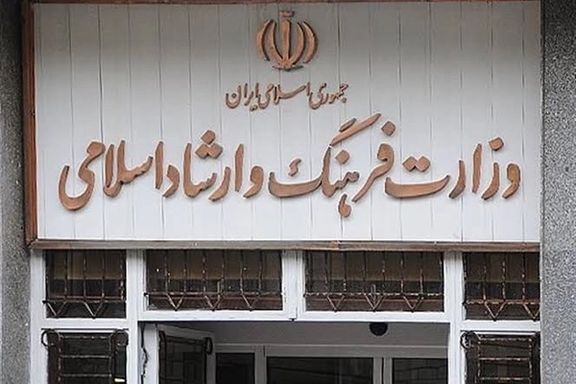
A group of Iranian artists have called on their peers and writers to boycott the Iranian culture ministry and to defy the censors.
In a statement, the activists calling themselves "Art/Culture/Action" center said: "We urge all the artists, writers, publishers, and those involved in Iranian film-making and drama not to recognize the cultural monitoring, to stand against the unjust censorship."
The signatories said that they will no longer seek permission from government institutions for any artistic and intellectual activity, including setting up exhibitions, publishing books and magazines, and making and screening movies.
The Art/Culture/Action Center introduced itself on Instagram as "a group comprising a number of Iranian art practitioners" that "was formed with the aim of supporting political, and civil freedom in Iranian art society".
During the nationwide protests following the killing of Mahsa Amini, many writers and artists expressed support for the demonstrators. Scores of writers and translators also announced that they would no longer cooperate with the ministry of culture.
As Tehran International Book Fair gets underway, many publishers and people have boycotted the fair according to reports.
Last year, dozens of Iranian writers and poets announced they will publish their works without submission for approval by the Islamic Republic, until censorship stops in Iran.
The announcement titled “We the literary” was published by a Canadian Iranian writer, Fereshteh Molavi, but it is signed by writers from Iran and the diaspora.
The clerical government in Iran requires all books, films and music be submitted for review or be censored before publication or screening. Works by artists perceived to have dissident ideas usually get rejected and others are altered to fit the religious and political boundaries of the authoritarian regime. Some books have been in limbo for years, waiting for permission.

British Iranian activist Vahid Beheshti has revealed that a fatwa calling for his death has been issued by a cleric in the Islamic Republic.
Recovering in hospital from a hunger strike of more than two months, the campaigner posted a video Tuesday saying: “Through my contacts in Iran, I have been given this latest information that the religious platform for my death has been issued by one of the clerics of Islamic Republic of Iran connected to IRGC.”
A defiant Beheshti added: “If you release 10 fatwas for my death. We won't stop our activities. We wouldn't step in this path.”
He has been in hospital since May 5, before which he had survived for 73 days on nothing but water, coffee, salt and sugar cubes.
His hunger strike outside the British Foreign Office in London had been devoted to raising awareness about atrocities committed in his homeland and to pressure UK Prime Minister Rishi Sunak to proscribe the IRGC as a terror group, Beheshti described it as “the most brutal mafia in the world”.
Beheshti said Sunak's government should not wait any longer to proscribe the IRGC but rather move forward now.
The activist warned if ministers refuse to act, IRGC agents will eventually force them to do so: “If they come to the streets of London and do something tragic, then it’s too late to wake up.”
Beheshti is not the only UK citizen under threat from Tehran. MI5, the UK's domestic security agency, revealed last year that at least ten Iranian plots to kill or abduct British citizens had been discovered.